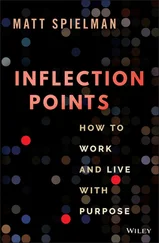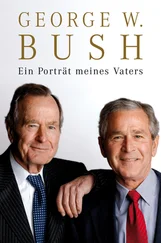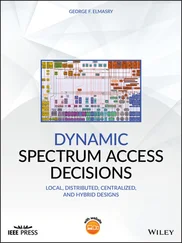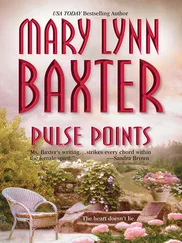He told me that sending American troops into combat in Pakistan would be viewed as a violation of Pakistani sovereignty. A revolt would likely ensue. His government would probably fall. The extremists could take over the country, including its nuclear arsenal.
In that case, I told him, his soldiers needed to take the lead. For several years, the arrangement worked. Pakistani forces netted hundreds of terrorists, including al Qaeda leaders like Khalid Sheikh Mohammed, Abu Zubaydah, and Abu Faraj al Libbi. Musharraf also arrested A.Q. Khan, the revered father of the Pakistani nuclear bomb, for selling components from the country’s program on the black market. As Musharraf often reminded me, Pakistani forces paid a high price for taking on the extremists. More than fourteen hundred were killed in the war on terror.
In return for Pakistan’s cooperation, we lifted the sanctions, designated Pakistan a major non-NATO ally, and helped fund its counterterrorism operations. We also worked with Congress to provide $3 billion in economic aid and opened our markets to more Pakistani goods and services.
Over time, it became clear that Musharraf either would not or could not fulfill all his promises. Part of the problem was Pakistan’s obsession with India. In almost every conversation we had, Musharraf accused India of wrongdoing. Four days after 9/11, he told me the Indians were “trying to equate us with terrorists and trying to influence your mind.” As a result, the Pakistani military spent most of its resources preparing for war with India. Its troops were trained to wage a conventional battle with its neighbor, not counterterrorism operations in the tribal areas. The fight against the extremists came second.
A related problem was that Pakistani forces pursued the Taliban much less aggressively than they pursued al Qaeda. Some in the Pakistani intelligence service, the ISI, retained close ties to Taliban officials. Others wanted an insurance policy in case America abandoned Afghanistan and India tried to gain influence there. Whatever the reason, Taliban fighters who fled Afghanistan took refuge in Pakistan’s tribal regions and populated cities like Peshawar and Quetta. In 2005 and 2006, these sanctuaries aided the rise of the insurgency.
In March 2006, I visited President Musharraf in Islamabad. Our meeting followed a stop in India, where Prime Minister Manmohan Singh and I signed an agreement clearing the way for nuclear cooperation between our two countries. The deal was the culmination of our efforts to improve relations between the world’s oldest democracy and the world’s largest democracy. I believe India, home to roughly a billion people and an educated middle class, has the potential to be one of America’s closest partners. The nuclear agreement was a historic step because it signaled the country’s new role on the world stage.
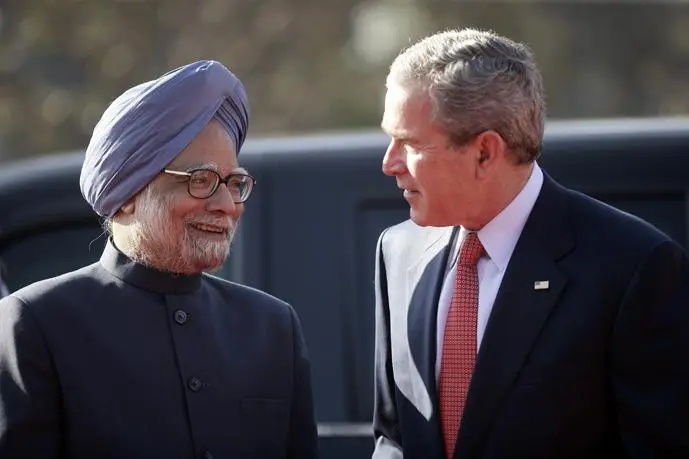
With Manmohan Singh. White House/Eric Draper
The nuclear deal naturally raised concerns in Pakistan. Our ambassador, a remarkable veteran Foreign Service officer named Ryan Crocker, argued strongly that we should spend the night in Islamabad as a sign of respect. No president had done that since Richard Nixon thirty-seven years earlier. The Secret Service was anxious, especially after a bombing near the U.S. consulate in Karachi the day before we arrived. But symbolism matters in diplomacy, and I wanted to signal that I valued our relationship. At the airport, a decoy motorcade drove to the embassy mostly empty. My chief of protocol, Ambassador Don Ensenat, took my place in the presidential limo, while Laura and I flew secretly via Black Hawk helicopter.
In contrast to the rigid security precautions, President Musharraf organized a relaxed and enjoyable visit. He and his wife, Sehba, received us warmly at their version of the White House, known as the Aiwan-e-Sadr. We met with survivors of the previous October’s 7.6-magnitude earthquake in northern Pakistan, which killed more than seventy-three thousand people. America had provided $500 million in relief. Our Chinook helicopters became known as “angels of mercy.” The experience reinforced a lesson: One of the most effective forms of diplomacy is to show the good heart of America to the world.
Later in the day, I went to the embassy courtyard to watch some cricket, Pakistan’s national pastime. There I met national team captain Inzamam-ul-Haq, the Pakistani equivalent of Michael Jordan. To the delight of the schoolchildren on hand, I took a few whacks with the cricket bat. I didn’t master the game, but I did pick up some of the lingo. At the elegant state dinner that night, I opened my toast by saying, “I was fooled by a googly,*** otherwise I would have been a better batsman.”
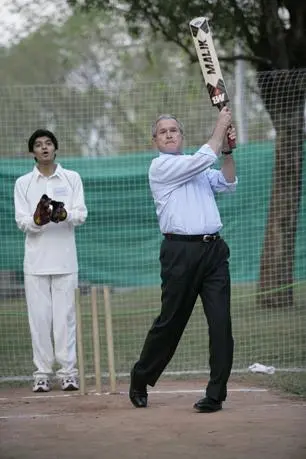
Playing cricket in Pakistan. White House/Eric Draper
My meetings with President Musharraf focused on two overriding priorities. One was his insistence on serving as both president and top general, a violation of the Pakistani constitution. I pushed him to shed his military affiliation and govern as a civilian. He promised to do it. But he wasn’t in much of a hurry.
I also stressed the importance of the fight against extremists. “We’ve got to keep these guys from slipping into your country and back into Afghanistan,” I said.
“I give you our assurances that we will cooperate with you against terrorism,” Musharraf said. “We are totally on board.”
The violence continued to grow. As the insurgency worsened, Hamid Karzai became furious with Musharraf. He accused the Pakistani president of destabilizing Afghanistan. Musharraf was insulted by the allegation. By the fall of 2006, the two were barely on speaking terms. I decided to step in with some serious personal diplomacy. I invited Karzai and Musharraf to dinner at the White House in September 2006. When I welcomed them in the Rose Garden, they refused to shake hands or even look at each other. The mood did not improve when we sat down for dinner in the Old Family Dining Room. Dick Cheney, Condi Rice, Steve Hadley, and I watched as Karzai and Musharraf traded barbs. At one point, Karzai accused Musharraf of harboring the Taliban.
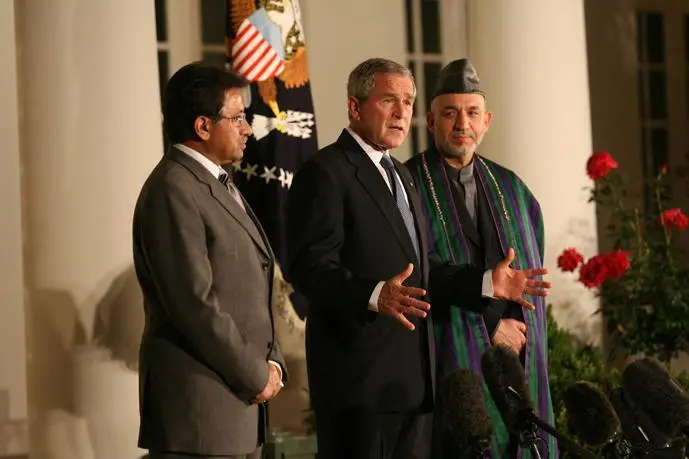
A tense Rose Garden welcome for Pervez Musharraf ( left ) and Hamid Karzai. White House/Eric Draper
“Tell me where they are,” Musharraf responded testily.
“You know where they are!” Karzai fired back.
“If I did, I would get them,” said Musharraf.
“Go do it!” Karzai persisted.
I started to wonder whether this dinner had been a mistake.
I told Musharraf and Karzai that the stakes were too high for personal bickering. I kept the dinner going for two and a half hours, trying to help them find common ground. After a while, the venting stopped and the meeting turned out to be productive. The two leaders agreed to share more intelligence, meet with tribes on both sides of the border to urge peace, and stop bad-mouthing each other in public.
As a way to staunch the flow of Taliban fighters, Musharraf informed us that he had recently struck a series of deals with tribes in the border region. Under the agreements, Pakistani forces would leave the areas alone, while tribal leaders would commit to stopping the Taliban from recruiting operatives or infiltrating into Afghanistan.
While well intentioned, the strategy failed. The tribes did not have the will or the capacity to control the extremists. Some estimates indicated that the flow of Taliban fighters into Afghanistan increased fourfold.
Читать дальше









